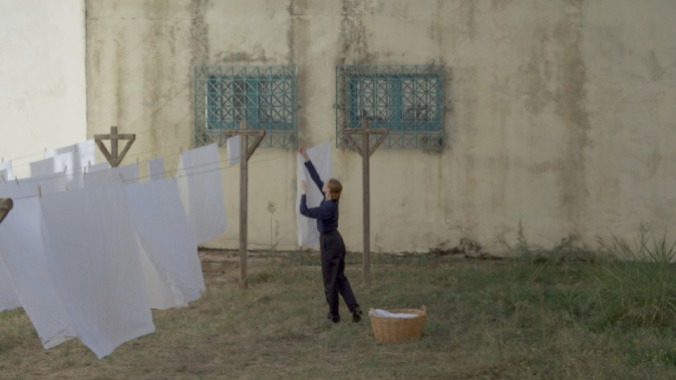Music Is a Vexing Retelling of Oedipus Rex

Very little is easy to decipher in German filmmaker Angela Schanelec’s Music. With minimal dialogue, languid static shots and unexpected timeline jumps (all staples of Schanelec’s previous output), the film is an onerous exercise in patience and intellectual rigor. Those unfamiliar with the director’s penchant for narrative opacity might find Music falling on deaf ears. For those up for the challenge, there are splendid moments of visual poise to soak in, but little to actually take away in terms of tangible storytelling.
Music acts as a (very) loose retelling of Sophoclese’s seminal tragedy Oedipus Rex, though Schanelec doesn’t overtly address the original tale’s question of fate versus free will. In fact, it takes quite some time to parse the parallels between Music and Oedipus Rex, but when the film’s sparse narrative is plainly recounted, it’s easy to make the connection. It opens with thick fog and thunderclaps amid a Greek mountaintop—recalling the ire of Gods residing on Olympus—before focusing on a baby found in a stone hut on the side of a road. He is taken in by a kindly couple, who bathe the baby’s red, swollen feet in the sea. Seamlessly shifting to decades later, the baby grows into a young man named Jon (Aliocha Schneider), whose feet are still bruised and battered. During a seaside excursion with friends, he commits manslaughter and is sentenced to a year in prison. Behind bars he meets Iro (Agathe Bonitzer), a striking female prison guard. The two soon develop a bond, and another timelapse finds them married with a child.
Of course, Iro eventually discovers the twisted truth about her husband’s ancestry—including his previously unknown relationship to the man he accidentally killed—and she cannot cope. Yet Music is by no means a beat-for-beat retelling of Sophoclese’s drama, even giving Jon an oddly optimistic ending. As the film’s title suggests, he navigates personal strife through music, namely classical baroque composers and then, during the film’s last act, soft rock. Jon’s proclivity for either genre is never really explained (though the former was certainly inspired by Iro’s recommendation while Jon was still incarcerated), though Schanelec has stated that discovering fringe Canadian singer-songwriter Doug Tielli is what led to the musical motif in the film’s final third, which finds Jon and his daughter living in Berlin as he composes music. Frankly, Schneider’s saccharine falsetto lends itself to opera far more than contemporary English-language indie sensibilities, making the film’s sonic intrigue end on a somewhat uneven note.
-

-

-

-

-

-

-

-

-

-

-

-

-

-

-

-

-

-

-

-

-

-

-

-

-

-

-

-

-

-

-

-

-

-

-

-

-

-

-

-








































